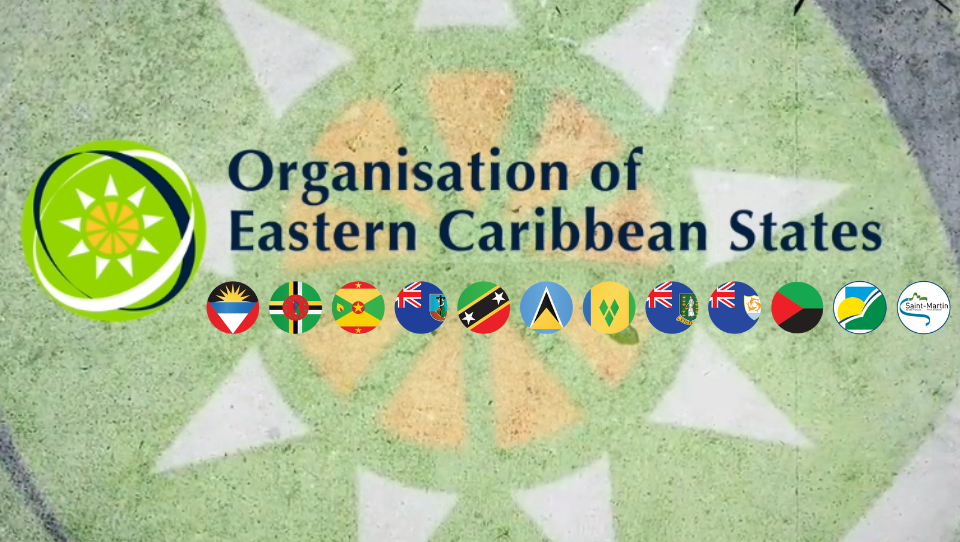About the OECS
About the OECS

The Organisation of Eastern Caribbean States (OECS) is an International Inter-governmental Organisation dedicated to regional integration in the Eastern Caribbean. Regional Integration is when countries in close proximity who share physical or cultural characteristics with each other, come together to achieve common goals. Some common goals would be to make trade easier with each other, share resources or solve problems together.

For Example, the OECS is a Regional Grouping of 12 countries in the Eastern Caribbean. The OECS makes it easier for any citizen and their family members of the 7 Protocol Countries: Antigua and Barbuda, Commonwealth of Dominica, Grenada, Montserrat, Saint Kitts and Nevis and Saint Lucia and Saint Vincent and the Grenadines to travel and live in any member state with a valid form of ID like a Driver Licence, National Identification Card, Voters Registration Card, Social Security Card or Passport.
The vision of the organisation for 2020-2024 is "A better quality of life for the people of the OECS" and Mission Statement: "To drive and support sustainable development through regional integration. collective action and development cooperation".
The Organisation of Eastern Caribbean States came into being on June 18th 1981, when seven Eastern Caribbean countries signed a treaty agreeing to cooperate and promote unity and solidarity among the Members. The Treaty became known as the Treaty of Basseterre, named in honour of the capital city of Saint Kitts and Nevis where it was signed.
The 1981 Treaty was replaced in 2010 with a Revised Treaty of Basseterre, creating an economic union which is an agreement between countries where barriers to trade are reduced or removed for a single market with a customs union where the 7 OECS countries (Antigua and Barbuda, Commonwealth of Dominica, Grenada, Montserrat, Saint Kitts and Nevis, Saint Lucia, Saint Vincent and the Grenadines) agreed to trade with each other without any tariffs or other trade barriers.
This Revised Treaty was signed on 18th June 2010 in Saint Lucia during the 51st Meeting of the Authority. The revised treaty establishes a unified financial and economic space, facilitating the free movement of goods, people, and capital. Additionally, it enables the harmonisation of monetary and governmental policies, relating to taxes and revenue. The countries of this economic union continue to adopt a common approach to trade, health, education and the environment, as well as the development of critical sectors such as agriculture, tourism and energy.
The OECS is now a twelve-member grouping comprising of the full Member States of Antigua and Barbuda, Commonwealth of Dominica, Grenada, Montserrat, Saint Kitts and Nevis, Saint Lucia and Saint Vincent and the Grenadines. These members are part of the Economic Union and receive the full benefits of the Economic Union, like free movement of people and goods. The British Virgin Islands, Anguilla, Martinique, Guadeloupe and Saint Martin are associate members of the OECS.
Slide your hand left to see otther column
Member State | Treaty | Membership | Revised Treaty |
|---|---|---|---|
Antigua and Barbuda | 18th June 1981 | Protocol | 18th June 2010 |
Commonwealth of Dominica | 18th June 1981 | Protocol | 18th June 2010 |
Grenada | 18th June 1981 | Protocol | 18th June 2010 |
Montserrat | 18th June 1981 | Protocol | 18th June 2010 |
Saint Kitts and Nevis | 18th June 1981 | Protocol | 18th June 2010 |
Saint Lucia | 18th June 1981 | Protocol | 18th June 2010 |
Saint Vincent and The Grenadines | 18th June 1981 | Protocol | 18th June 2010 |
British Virgin Islands | 22nd Nov. 1984 | Associate | - |
Anguilla | 24th May 1998 | Associate | - |
Martinique | - | Associate | 4th Feb 2015 (9th April 2016 - Formal) |
Guadeloupe | - | Associate | 14th March 2019 |
Saint Martin | - | Associate | 19th March 2025 |

